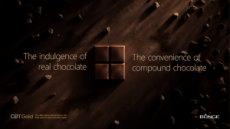New products for China's little emperors
in targeting the country's only-children, who are commanding an
increasing share of their parent's rising incomes.
China's one-child policy, preventing most Chinese families from having more than one child, has resulted in more attention, time and money being lavished on single children by increasingly affluent parents. The phenomenon has caused some to dub Chinese children 'little emperors' due to the power they seem to wield within their own families. Chinese parents spend up to 50 per cent of their total family income on their child, according to research by the China Academy of social sciences in 2004, although some researchers estimate the percentage to be much higher. Children are also getting more spending money of their own.The trend has not escaped food makers who are increasingly offering higher-value confectionery or snack products to appeal to both children and parents. Among the most innovative of those launched this year is the Pinwheel Pop brand spinning lollipop introduced by Beijing Zhengfengguangyan Trade Company. A new slant on the rotating lollipop theme, it has five fruit-flavoured sections that can be spun using the switch on the base to give either a combination of flavours in one go, or stopped on one section if preferred. The flavours include blue raspberry, grape, strawberry, green apple and sour pineapple. Analysts at Mintel's Global New Products Database say such a concept adds value to a new launch. "The choice of flavours, laid out in such an innovative and playful manner, is what helps this product stand out. Working on the same basic premise as the popular pinwheel wind-toys, it is an instantly recognisable format associated with youth." Mintel's Global New Products Database picked the product out as being strong in both originality and positioning, although the product loses out in terms of price. More than €2 per piece, it is still expensive for the amount of confectionery on offer. Another trading firm, Tianxuming Trade, has innovated in packaging with Hello Kitty brand cookies sold in a re-usable container. Packages to entertain children once the contents have been eaten are gaining momentum in global markets, according to Mintel, as the reusability of packaging adds a new incentive for parents. The Chinese cookie tin contains biscuits suitable for breakfast and once empty, it becomes a musical moneybox, playing a tune every time money is put through the hole in the lid. It will also appeal to fans of the Hello Kitty trend. Another confectionery maker that knows how to attract parents' attention is Korean group Crown, which launched a Strawberry DHA Milk Ball on the Chinese market this year. The omega-3 fatty acid DHA (docosahexaenoic acid) is already common in confectionery in Asia, designed to help children's brain and eye development. But the Strawberry Milk Balls, made from condensed fresh milk, have also been enriched with casein phospho peptides, a dairy protein said to promote the effective absorption of calcium into the body and protect teeth. "This is an interesting combination of advantageous ingredients into an indulgent item, essentially covering the main areas of concern for the healthy development of children," said Mintel analysts on its launch, giving it a high score for formulation. Health is a growing concern for Chinese parents, as an increase in child obesity raises their attention to nutrition. About 8 per cent of children in China are obese, and while this is still far below the United States, where 31 per cent of children are overweight or at-risk, the percentage in China has doubled in 10 years. Although China's one-child policy has lifted nutrition levels for most of the country's 265 million under-14s, recent research suggests it could also be contributing to rising child obesity. Shu Wen Ng, a US public-policy researcher at Chapel Hill, North Carolina, told a conference last year that she had found single children consumed 1.2 to 1.3 more percentage points of fat compared with children in multi-child houses. In 2005, there were about 265 million children under the age of 14, or about 20.27 per cent of total population, according to China's National Bureau of Statistics.











